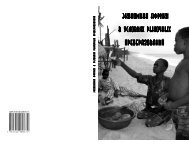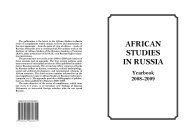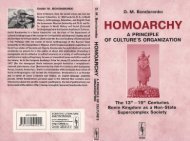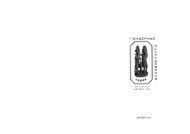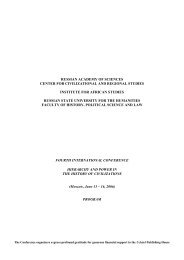L. Fituni, I. Abramova Resource Potential of Africa and Russia's ...
L. Fituni, I. Abramova Resource Potential of Africa and Russia's ...
L. Fituni, I. Abramova Resource Potential of Africa and Russia's ...
Create successful ePaper yourself
Turn your PDF publications into a flip-book with our unique Google optimized e-Paper software.
World prices on all types <strong>of</strong> minerals are subject to substantial<br />
fluctuations with time. During the last 27 years, for example, the<br />
minimum <strong>and</strong> maximum gold <strong>and</strong> copper prices differed by a factor<br />
<strong>of</strong> about 3.5 <strong>and</strong> 4.6, respectively; the time amplitude varied from 2-<br />
3 to 5–8 years. The use <strong>of</strong> permanent quality requirements is inadmissible<br />
under such conditions.<br />
To reduce excess pr<strong>of</strong>its when prices for a mineral rise sharply, it<br />
is highly advisable to use temporary quality requirements with a respective<br />
decrease in its cut<strong>of</strong>f grade <strong>and</strong> minimum economic content.<br />
One <strong>of</strong> the problems frequently associated with a nation’s rich<br />
resource endowment is alleged widespread corruption linked with<br />
the abuse <strong>and</strong> manipulations by the government <strong>of</strong>ficials in the mining<br />
sphere. <strong>Africa</strong>n countries <strong>and</strong> Russia are <strong>of</strong>ten presented as possibly<br />
the worst examples <strong>of</strong> wide spread corruption.<br />
However, this stereotype is not fully applicable in the field <strong>of</strong><br />
natural resource management. While the Corruption Perception index<br />
<strong>of</strong> Transparency International for the Russian Federation continued<br />
to be quite negative in 2010, another important indicator,<br />
which refers to the level <strong>of</strong> transparency in research management,<br />
was among the best in the world.<br />
The Russian authorities have made their country the world’s<br />
third most transparent nation in the management <strong>of</strong> mineral resources,<br />
including the production <strong>of</strong> oil, gas, diamonds <strong>and</strong> gold.<br />
According to the Revenue Control Index, the most open nation is<br />
Brazil, followed by Norway. The least open is Turkmenistan. The<br />
main exporters <strong>of</strong> mineral resources, such Saudi Arabia, Qatar <strong>and</strong><br />
Algeria, are also trailing the majority <strong>of</strong> the nations on the list.<br />
The rating is compiled by Transparency International, a nongovernmental<br />
international organization to fight corruption <strong>and</strong> inquire<br />
into corruption rates the world over <strong>and</strong> the Revenue Watch Institute,<br />
an international centre for economic analysis. The research<br />
concentrates on the countries making open financial reports on the<br />
production <strong>and</strong> sale <strong>of</strong> mineral resources.<br />
Almost all <strong>of</strong> the 41 countries on the list see the entrails <strong>of</strong> the<br />
earth as public domain, yet in many <strong>of</strong> these the general public is<br />
only vaguely aware <strong>of</strong> the way the authorities dispose <strong>of</strong> the national<br />
97



